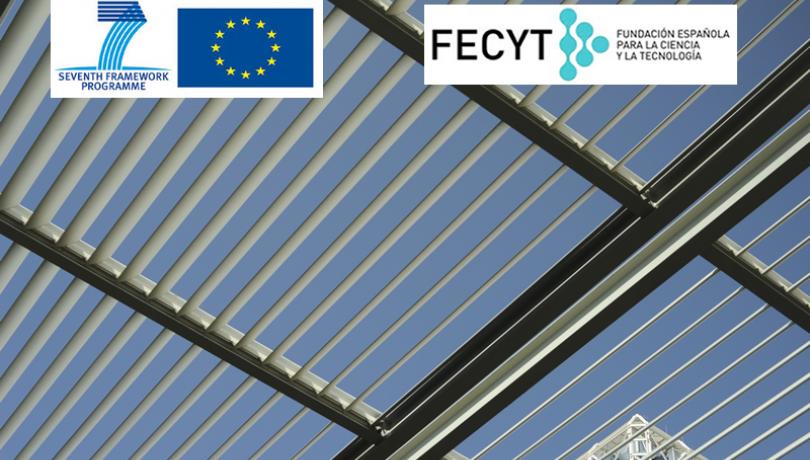In 2014 the Institute of Marine Sciences started 3 new projects funded by the Seventh Framework Programme of the European Commission, and with 2 outreach projects funded by the Spanish Foundation for Science and Technology (FECYT) of the Ministry of Economy and Competitiveness.

In 2014 the Institute of Marine Sciences started 3 new projects funded by the Seventh Framework Programme of the European Commission, and with 2 outreach projects funded by the Spanish Foundation for Science and Technology (FECYT) of the Ministry of Economy and Competitiveness. The Coastal Biological Processes team, led by Esther Garcés, researcher at the Department of Marine Biology and Oceanography, participates in the European project "MARIBOX: Marine environmental site assessment and monitoring tool box" on the development and implementation of automated analysis sensors of pollutants and algal toxins in the marine environment. The developed control devices will be installed on buoys analysis in different coastal towns of Catalonia in situ data for real-time and low cost. The ultimate goal of the project is to create MARIBOX profitable and adequate system for monitoring contaminants and algal toxins in the marine environment. The project is led by NEC Research and Innovation Center of Cyprus, and involves 7 research groups and 6 companies from 6 European countries (Cyprus, Spain, Ireland, UK, Italy and Norway).
The Oceanographic Observation team, led by Jordi Salat, from the Departament of Physical and Tecnological Oceanography, participates together with two other groups from the Institut de Ciència de Materials de Barcelona, also within the CSIC, in the project “COMMON SENSE: Cost Effective Sensors Interoperable with International Existing Ocean Observing Systems to meet EU policies Requirements”. According to this objectives prototypes of new low cost autonomous sensors for ocean monitoring (including eutrophication, heavy metals, marine litter and plastics, and underwater noise), will be developed and tested in all kind of platforms such as drifting buoys, fixed arrays and vessels of opportunity including racing ships participating in oceanic races as the BWR, etc. The consortium for this project is led by Leitat, Technological Centre from Terrassa and formed by 15 teams from 7 european countries: Germany, Spain, Ireland, Italy, Macedonia, Poland i the United Kingdom. This consortium covers a wide range of disciplines, from the electronics and new materials to the oceanographic observation, with a deep experience on the European seas: the Atlantic Ocean and the Mediterranean, North and Baltic seas.
Pedro Elosegui, also a member of the Department of Physical and Technological Oceanography, leads the ICM team participating in the project “ICE-ARC: Ice, Climate, and Economics – Arctic Research on Change”. The mission of ICE-ARC is to assess the social and economic impacts, both at the local and global scale, resulting from the shrinkage of the sea-ice coverage in the Arctic. The project has two main axes of research. On one side, it aimed to improve the observation and modeling of sea-ice dynamics in the Arctic in order to forecast with less uncertainty its near-future evolution. On the other side, ICE-ARC will use the outputs of the ice-sea-atmospheric physical model as inputs to force an ecosystem model that on its turn will be used to force a complex economic-impact model (PAGE-ICE). The final output of the economic model will serve not only to assess the impacts to come, but also which are the best policies to adopt in order to improve the adaptation of the Arctic societies. The coordinator of ICE-ARC is the British Antarctic Survey from the Natural Environment Research Council (NERC-BAS). The consortium includes 19 other research centers, universities and companies from Netherlands, Denmark, Norway, Germany, France, Belgium, Italy and the Russian Federation.
This year, the ICM will also lead two projects in the field of participatory science funded by the FECYT Foundation.
One of the projects, "MARDUINO : my buoy , our data and the Sea" , led by Carine Simon from the Group of Optics Oceanography, Department of Physical Oceanography and Technology , is focused on students at secondary education. Its main objective is to involve students to develop buoys with low-cost sensors to obtain measures of the sea quality. These buoys, developed in the European project CITCLOPS, allow the estimation of water transparency , a parameter that is usually associated with environmental quality. During the project, students will discover that water transparency is not only a water quality indicator but one of the key factors for the entire marine ecosystem. Students will build the buoys during workshops with scientists. In this project, two Catalan companies “Plancton, Divulgación y Servicios Marinos” and “Geomedia” are also involved.
The second outreach project funded this year " SEA WATCHERS : Are you a good observer? Contribute to a scientific project!" led by Elisabetta Broglio , head of the scientific dissemination Area at the Institute of Marine Sciences, and involving different researchers from other departments. This project aims to show to the public the Mediterranean environmental problems, and promote their participation in the research carried out at the Institute of Marine Sciences. The participation of citizens is key to obtaining data at spatial and temporal scales necessary to have an overview of the state of our seas. These data can be collected by citizens who go to sea for professional or playful way. For example, citizens can collaborate with scientists in 1) knowing what are the possible effects of rising temperature on our sea ecosystems, 2 ) knowing what new fish invasive species arrive to our seas, 3) detect potential fluctuations in jellyfish proliferation. The project, which runs from 2012 with the web site www.seawatchers.org , has already been presented in Catalonia and currently has over 2000 comments and nearly 400 citizens registered. With the new funding the initiative will be speared to other Spanish autonomous communities through conferences on the scientific projects and sea workshops addressed to citizens who want to learn specific methodologies for data collection.